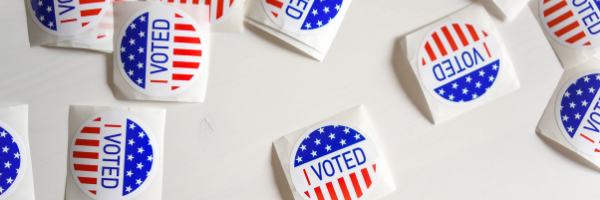Welcome to the Wednesday, August 4, Brew. Here’s what’s in store for you as you start your day:
- Brown, Carey win special primaries in Ohio’s 11th, 15th Districts
- Supporters of Newsom recall sue over voter guide language
- 2021 year-to-date Federal Register page total tops 41,000
Brown, Carey win special primaries in Ohio’s 11th, 15th Districts
Voters decided primaries for special elections in two Ohio congressional districts Tuesday. Here are those results:
Ohio’s 15th Congressional District
Mike Carey defeated 10 candidates to win the special Republican primary in Ohio’s 15th Congressional District. As of 9:30 p.m. ET, Carey had received 37% of the vote, Bob Peterson was second with 15%, Ron Hood was third with 14%, and Jeff LaRe was fourth with 11%. The special election will fill the vacancy left by Steve Stivers (R), who resigned in May to become the CEO of the Ohio Chamber of Commerce.
Carey was chairman of the Ohio Coal Association and is a U.S. Army National Guard veteran. Former President Donald Trump (R) endorsed him on June 8. The Make America Great Again Action Inc. PAC spent almost $350,000 supporting Carey. Peterson, a farmer and member of the Ohio state legislature, was endorsed by the Ohio Right to Life PAC.
Carey will face state Rep. Allison Russo (D)—who won Tuesday’s Democratic primary—in the Nov. 2 general election. Trump won the district, 56% to 42%, over President Joe Biden (D) in the 2020 presidential race. Stivers was first elected in 2010 and won six elections in the district by an average margin of victory of 24 percentage points. Inside Elections rates the general election as Solid Republican.
Ohio’s 11th Congressional District
Shontel Brown won the special Democratic primary for Ohio’s 11th Congressional District on Aug. 3. As of 11 p.m. ET, Brown had received 50% of the vote to Nina Turner’s 44%. Eleven other candidates split six percent. Former incumbent Marcia Fudge (D) resigned the seat in March to become Housing and Urban Development secretary in President Biden’s administration.
Brown serves on the Cuyahoga County Council and chairs the county’s Democratic Party. Turner is a former state senator and former member of the Cleveland City Council who worked on Bernie Sanders’ 2016 and 2020 presidential campaigns.
Hillary Clinton, the Congressional Black Caucus PAC, and House Majority Whip James Clyburn (D-S.C.) were among Brown’s endorsers. Turner’s endorsers included Sanders, the Congressional Progressive Caucus PAC, and Rep. Alexandria Ocasio-Cortez (D-N.Y.). Labor groups split endorsements in the primary. Satellite spending groups spent more than $3 million during the Democratic primary. Of that, $2 million came from Democratic Majority For Israel, which endorsed Brown.
Brown will face Laverne Gore (R)—who won Tuesday’s Republican primary—in the Nov. 2 general election. Biden won the district over Trump, 80% to 19%, in the 2020 presidential election. Inside Elections rates the general election as Solid Democratic.
Supporters of Newsom recall sue over voter guide language
There are about six weeks until the Sept. 14 recall election of California Gov. Gavin Newsom (D). Here are some recent updates:
Voter guide lawsuit
Two supporters of the recall filed a lawsuit on July 29 challenging the language used in the state’s official voter guide. Orrin Heatlie and the California Patriot Coalition sued California Secretary of State Shirley Weber (D) in Sacramento County Superior Court, arguing that the guide’s language that Newsom provided “mirror his and his supporters’ paid advertisements.”
The court has scheduled a hearing in the case for today—Aug. 4. The deadline for public review and legal challenges related to the voter guide is Aug. 6. The voter guide will be mailed to voters by Aug. 24.
The lawsuit also says Newsom should not be able to refer to himself as a “Democratic governor.” Sacramento County Superior Court Judge James P. Arguelles ruled on July 12 that Newsom’s party affiliation will not appear on the recall ballot. In his official response to the recall on Feb. 20, 2020, Newsom did not file a form stating his party preference.
Heatlie began this recall campaign against Newsom in June 2020. In May 2021, the secretary of state’s office reported that 1,719,943 valid signatures were submitted—more than the 1,495,970 necessary to trigger a recall election. Lt. Gov. Eleni Kounalakis (D) called the recall election on July 1.
Campaign Finance
The most recent campaign finance data in the race is available through June 30. The table below summarizes data for the four committees registered to support a “Yes” vote on the recall and the four committees registered to support a “No” vote.
2021 year-to-date Federal Register page total tops 41,000
From time to time, I like to check in on the number of pages that have been added to the Federal Register so far this year. The Federal Register is a daily journal of federal government activity that includes presidential documents, proposed and final rules, and public notices. It is a common measure of an administration’s overall regulatory activity, accounting for both regulatory and deregulatory actions.
From July 26 through July 30, the Federal Register grew by 1,442 pages for a year-to-date total of 41,380. Through July 31, 2020, it grew by a year-to-date total of 46,528 pages. Through July 28, 2017—during the first year of President Trump’s (R) administration—the Federal Register grew by a year-to-date total of 35,434 pages.
Ballotpedia has maintained data on page additions to the Federal Register and the number of federal administrative agency documents on a weekly basis since 2017.
Keep reading


